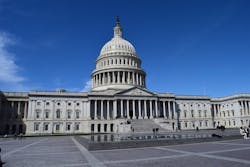Senators introduce legislation to improve transportation access, mobility challenges
U.S. Senators Tammy Baldwin (D-Wisconsin) and Joni Ernst (R-Iowa) today introduced bipartisan legislation to improve transportation access, help solve mobility challenges, and boost economic opportunity.
The Connecting Opportunities through Mobility Metrics and Unlocking Transportation Efficiencies (COMMUTE) Act provides data to states and local governments to measure accessibility to local businesses and important destinations, and inform investments in transportation systems.
“Individuals without cars—including low-income workers, seniors, and people with disabilities—are oftentimes isolated from areas experiencing job growth and other destinations important to daily life. These destinations include not only jobs, but also school and workforce training, medical facilities, grocery stores, childcare, and affordable housing,” Senator Baldwin said in a statement. “This bipartisan legislation is about investing in more efficient transportation so workers and families are better connected to what they need.”
Lawmakers say states and local communities face challenging decisions about how to best allocate transportation resources to connect employers with workers, while also improving access to daily errands and public services. Information about where jobs and other important destinations are located, and where transportation access can be made more convenient, can better inform locally-driven decisions about how to most effectively invest transportation resources and design with access in mind.
The COMMUTE Act requires the U.S. Department of Transportation (U.S. DOT) to provide states, metropolitan planning organizations, and rural planning organizations with data sets measuring the level of access by multiple transportation modes to important destinations. Those destinations include jobs and areas with a concentration of available jobs, health care facilities, childcare services, educational and workforce training facilities, affordable housing and food sources, as well as connections to transit or rail service, bike routes, and sidewalks. U.S. DOT will select eligible states, metropolitan planning organizations, and rural planning organizations to participate in the program on a competitive basis. Data will also be made available to local governments and researchers.
---------
SOURCE: Office of Senator Tammy Baldwin
